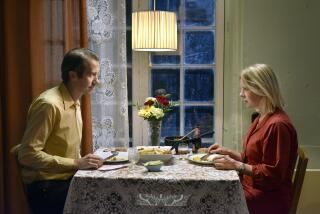MOVIE REVIEW : ‘Match Factory’: Stark Images Burn Bright : Aki Kaurismaki’s weird, chilly masterpiece depicts a prototype loser living in a Helsinki of dysfunctional families, misused romance and skewed Americana.
- Share via
Great movies, like sudden romances, sometimes spring up in strange places. Aki Kaurismaki’s “The Match Factory Girl” (Laemmle’s Monica), a harsh little tale of a woman wronged, barely 70 minutes and shot for peanuts, comes from Finland, a country with a sparse cinematic history. Yet it has the sure touch, inexorable flow and after-effect of a masterpiece.
A weirdo masterpiece, to be sure: funky and minimalist, caustic and heartfelt, puckishly wry and despairingly dark. “The Match Factory Girl” is shot so simply and starkly, with such apparent affectlessness that it becomes hypnotic. Set in a landscape--the barren and oddly bluish street terrain of Helsinki--almost lunar in its bleakness. Perfectly acted, perfectly shot, it carries us, brilliantly, into his bizarre but eerily recognizable milieu: a chilly realm of spiritless work, destructive families, bastardized American pop culture and exploitative romance.
The story details the lamentable life and horrific revenge of someone the average Hollywood movie would reject: a poor, skinny little Helsinki working girl named Iris (Kati Outinen), whose floppy blond hair, receding chin and pale, yearning eyes stamp her as a loser.
A quintessential loser. Slaving away cheerlessly in a match factory, whose operations Kaurismaki gives us with a documentarian’s crisply detached thoroughness, Iris is exploited by her bone-lazy parents, ignored by her co-workers, and left alone, night after night, as a hopeful but eternal wallflower at the local dance-bar--until, finally, she’s picked up, impregnated and dumped by an upper-class cad.
Kaurismaki’s style is weird, double-edged. At various moments, he suggests a post-modern Hans Christian Andersen, a Scandinavian Jim Jarmusch or a rock ‘n’ roll Robert Bresson--if that great French director had lost his religion and gained a mean sense of humor. Finnish rock, an oddball cultural transplant, defines Kaurismaki’s split sensibility; it echoes through both “Match Factory Girl” and its accompanying short subject--the hilarious Leningrad Cowboys jape “Those Were the Days.”
In a way, the mutant Finnish rockabilly fills a void in Iris’ life and in the film--which is otherwise so empty of dialogue and noise that the clang of a dish, the screech of a brake or the slam of a door can fray your nerves.
Sentimentality would seem the major trap of this story. Even the title recalls the most poignant of Andersen’s fairy tales: about the little match girl who froze to death on Christmas Eve, striking her matches and dreaming her dreams, while the uncaring rich caroused, callously, all around her. Jean Renoir filmed that fairy tale beautifully, in 1928, but Kaurismaki is the same director who made ruthlessly mundane and sarcastic Finnish versions of Dostoevsky, Shakespeare and Merger and Puccini’s “La Vie de Boheme.” In his hands, the match girl might have turned pyromaniac, burned down the mansions and barbecued the gentry.
Revenge is the ultimate theme of this “Match Factory Girl”--but it’s shown so coldly, so severely, that it’s hard, except for some memorably nasty little jokes, to take pleasure in it. Kaurismaki indulges neither bloodlust nor pathos. Midway through, as in “Ariel,” he gives us a snatch on the radio of Tchaikovsky’s majestically sorrowful “Pathetique” Symphony, only to quickly, brutally switch it off.
Switched-off people in a switched-off world, moving monotonously through barrenness and absurdity: that’s Kaurismaki’s usual milieu and subject. He’s a poet of the underclass, and, like Mike Leigh or Ken Loach, he presents them without condescension or apologies, his eye always open to emptiness and terror.
Yet he’s no defeatist. Iris is a cock-eyed heroine here, precisely because she’s a dreamer and a striver--because she believes in romance--or, at least, in romance novels--and hopes, until the end, for the best. The movie’s saddest moment is probably her recitation of a letter she writes to her creepy yuppie architect-seducer, who regards Iris as a quickie and a nuisance and just wants to be rid of her. And its cruelest joke is the glint in her eyes, when she knocks off another barroom Romeo--who might possibly be a nice guy.
Kaurismaki has been the darling of urban American and international film critics for several years. His “Ariel” was named best foreign-language film of 1990 by the National Society of Film Critics.
But “The Match Factory Girl” (Times-rated: Mature, for sensuality and violence) is clearly the masterwork of his 10-year career. It catches our eyes, burns its images into our mind. And just as Iris distantly resembles the little match girl, this harrowing film distantly recalls her fiery match-dreams: flaring up suddenly, casting a lurid yet comforting glow, and then, just as swiftly, expiring into darkness.
‘The Match Factory Girl’
Kati Outinen: Iris
Elina Salo: Iris’ Mother
Esko Nikkari: Iris’ Stepfather
Vesa Vierikko: The Man
A Villealfa Productions/Swedish Film Institute production, in association with Esselte Video, Finnkino, released by Kino International Corp. Director/Screenplay/Producer/Editor Aki Kaurismaki. Cinematographer Timo Salminen. Costumes Tuula Hilkamo. Set design Risto Karhula. Running time: 1 hour, 10 minutes.
Times-rated: Mature (sensuality and violence).
More to Read
Only good movies
Get the Indie Focus newsletter, Mark Olsen's weekly guide to the world of cinema.
You may occasionally receive promotional content from the Los Angeles Times.










